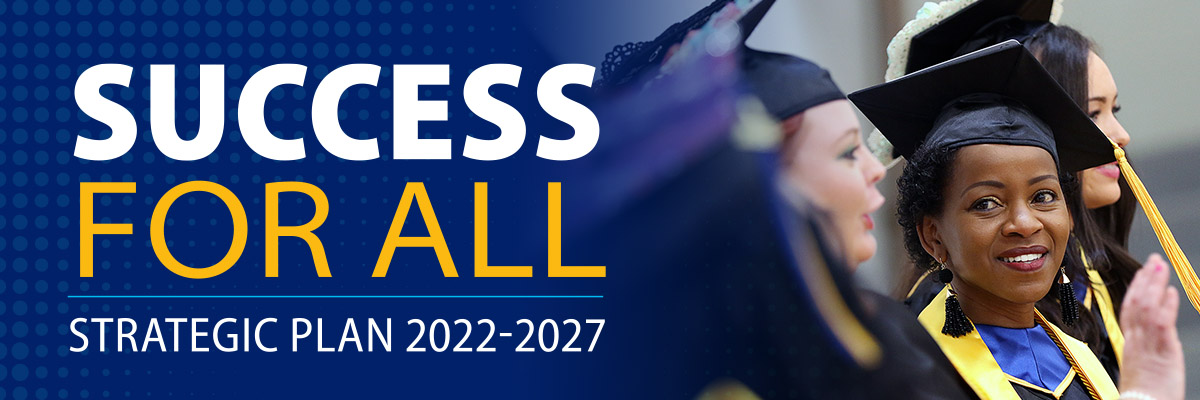
Success for All at NECC
Strategic Planning Process
Timeline and Planning Process
Success for All at NECC was developed through Appreciative Inquiry (AI), a broadly engaging approach to positive change that explores our strengths, opportunities, aspirations, and desired results as a means for determining what we will best achieve for our students and the communities we serve.
The AI process progresses through phases, beginning with “Discovery” (identifying an affirmative topic and engaging as many people as possible in exploring it through an inquiry process); then “Dream” (creatively imagining together what is possible); “Design” (creating specific strategies for evolving into the shared “dream” or vision); and, finally, “Destiny,” (implementing the goals and strategies that have been co-created).
Discovery
The planning process commenced in the spring of 2021 when NECC’s All-College Assembly Executive Committee, a representative group of college faculty and staff, met with President Lane Glenn and approved the overall design of the planning process.
During the summer of 2021, the college engaged Cockell McArthur-Blair Consulting, globally known for their AI work with higher education institutions, to work with us, and they helped NECC form a Strategic Planning Core Team which began establishing working groups, reviewing the college’s recently completed and approved NECHE 10-year comprehensive evaluation, and outlining tasks, timelines, and events.
The NECHE comprehensive evaluation was foundational to the strategic plan. Among key points in the NECHE evaluation, were the need to strengthen the college’s overall assessment and evaluation procedures and to place additional focus on the diversification of representative boards. The committee also considered NECC’s strengths highlighted in the NECHE evaluation for continued prioritization, such as our professional development standards and culture of innovation and resilience.
In August of 2021, the Strategic Planning Core Team met with DHE Commissioner Carlos Santiago and Senior Associate Commissioner for Strategic Planning and Public Program Approval Winnie Hagen for “Touch Point 1” to discuss our planning process and the integration of statewide goals, particularly the Equity Agenda.
The strategic planning process was officially announced and launched during the college’s September 2021 Convocation, at which time hundreds of members of the campus community were invited to participate in AI exercises using prompts provided by our strategic plan facilitators. This provided an opportunity for common themes to emerge that would later guide our interview and discussion phase.
Dream
Throughout September, the strategic planning committee engaged in formal discussions with both external and internal audiences, interviewing subgroups to analyze themes and discover and design metrics that will positively shape the future of the college. The results of these diverse and inclusive interviews in turn defined the parameters for the next phase of the process: the Strengths, Opportunities, Aspirations, and Results (SOAR) forums, which narrowed the college’s key strategic goals.
McArthur-Blair and Cockell (2018) describe SOAR as “a process that engages people in questions to identify their strengths, opportunities, aspirations, and results in order to build a plan for the future. SOARing into their future energizes people. In resilience work, a focus on strengths, opportunities, aspirations, and results can increase hope and assist leaders in identifying a path forward.”
The SOAR forums provided an important opportunity for college community members to attend open discussions, in which a volunteer moderator presented one of the core themes that had emerged from the AI interviews and provide attendees with open-ended questions on the themes to brainstorm the strengths, opportunities, aspirations, and results that applied to each. The responses from these forums, provided in detail in the Appendix, were then curated into recommendations by the core team and Office of Institutional Effectiveness.
Through the creation of the Core Group, and the invitations proactively shared to engage in the subgroups and subsequent SOAR Forums, we sought input from a cross-section of the college including representatives of varying academic disciplines, roles (both in terms of seniority and type of position), races, ethnicities, religions, nationalities, gender identities, sexual orientations, age, disabilities, and more.
Design
In November and December of 2021, the recommendations from the SOAR forums were turned over to the writing team, which drafted the final strategic goals and focus areas into an outline of the strategic plan. With support and feedback from the All-College Assembly Executive Committee, the Leadership Cabinet, and the core team, the document was broadened into a cohesive narrative and distributed to the college community for final feedback and approval in January 2022.
NECC’s Board of Trustees, whose members had been receiving monthly updates on the planning process, discussed and approved the draft strategic plan on February 2, 2022.
In the Spring of 2022, a series of initiatives, metrics, and implementation plans were also developed that would support each one of the goals and ensure their smooth transition into achievable action plans at the division, department, and individual levels.
As we considered our metrics and target goals for the next five years, we reflected on data from the last five years, analyzing trends from pre-, during, and post COVID-19 periods. We also consulted external data from myriad sources regarding local, regional, and national trends. While we recognized that some of our student success metrics have trended down in the last two years due to the COVID19 pandemic, we set bold targets for our metrics. Rather than limiting them to conservative estimates based on the impacts of COVID-19, we confidently set our metric goals to be improvements upon our pre-COVID data.
During the summer of 2022, the final draft of Success for All at NECC was shared with Commissioner Santiago and Senior Associate Commissioner Hagen as part of Touch Point II, to ensure alignment with the statewide equity agenda and the BHE’s strategy for public higher education in Massachusetts.
Additionally, the draft plan was shared with consultants from EAB, the national education strategy advising group, for their feedback on how well NECC’s planned goals, strategies and metrics align with current trends and best practices in higher education strategic planning.
Destiny
While the year NECC has spent on the strategic planning process itself, broadly engaging our campus community and other stakeholders in “Discovery” and in “Dreaming” and “Designing” has been vital to the creation of Success for All at NECC, the most important work still lies ahead of us, in the “Destiny” phase of our AI and planning process, as we turn our goals and strategies into action and accomplishment.
During the “Destiny” phase, which begins in the fall of 2022 and extends for the next five years, the Office of Institutional Effectiveness will first develop a landing page on the NECCi website that will serve as a living resource for all strategic planning related activities. Any member, internal or external, of the NECC community will be able to visit this website to access the final version of Success for All at NECC and interact with internal and external (PMRS) dashboards that illustrate the college’s progress on the strategic planning metrics.
Collegewide strategy implementation teams will be formed, and divisions, departments, and individuals will use the Success for All at NECC framework, and the tools of Appreciative Inquiry, to create their own operational plans that roll up to the strategic goals and metrics. Our final strategic plan is built with the understanding that our planned “Destiny” will be successful only as it is shared, chronicled, implemented, and measured at the division, department, and individual level. This cyclical and reflective process empowers NECC to stay innovative, agile and responsive to our students’ needs and to our constantly-changing environment.

Overview of Strategic Plan Goals
Five goals form the foundation of Success for All at NECC: Community Impact, Academic Innovation, Assessment and Informed Improvement, Student Support, and Employee Excellence.
At the center of each of these goals is the commitment to equity, as the drive for equity stands at the core of every action, every initiative, and every change we make at NECC. In partnership with our peer community colleges, the public four-year institutions in Massachusetts, and our PK-12 partners, we reaffirm the urgency of the Board of Higher Education’s Equity Goals, and strive to accomplish those through the five goals articulated in this plan.
First, the Community Impact goal provides insight into how we will effectively partner on initiatives that close equity gaps and strengthen economic vitality.
Through the Student Support and Academic Innovation goals, we detail the ways in which we will continue to invigorate our campus’ innovative spirit and examine and eradicate the barriers that stand in the way of college success, with a particular focus on closing equity gaps within our institution and community wide.
Meanwhile, through Assessment and Informed Improvement, we will strengthen our evaluation procedures based on quantitative and qualitative research and perform consistent cultural assessments, disaggregating our analysis through an equity lens.
Finally, our commitment to Employee Excellence will emphasize the needs of our employees and will commit to and be accountable for NECC’s Core Values of diversity, equity, and inclusion. Through all of these, we will strategically and effectively set up the college to build a solid foundation for all students’ long-term success.
We are confident that, looking across the next five years, stakeholders at every level of the institution will use this plan to align their work with the college’s vision for the future, looking closely at metrics to keep on track with strategic goals.
Assessment and planning tools will ensure clear implementation timelines and expectations at both the department and individual level, allowing everyone in our campus community to see themselves within the plan.
We present this strategic plan as a blueprint for what is possible over the next five years as we build on our strengths and successes. Through the implementation of these strategies, we will together secure a more just, equitable, and accessible experience for our students and community.
Print View